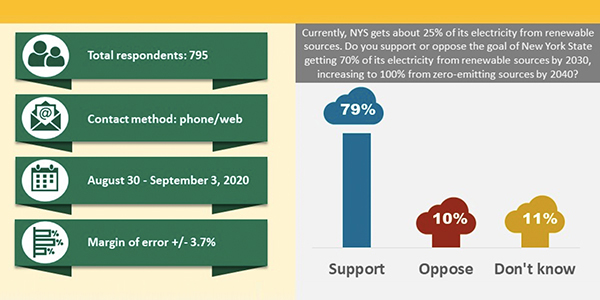More than 60% of New Yorkers said they approve of NYISO’s carbon pricing plan after learning of the advantages of such a price in the state’s wholesale electricity markets, according to a poll released by the ISO on Monday.
A joint task force between NYISO and the state’s Public Service Commission issued a proposal last December that would use the social cost of carbon (SCC) as a baseline for such a price.
The poll conducted by Siena College Research Institute (SCRI) showed how an informed opinion increased support for carbon pricing.
When respondents were initially asked about NYISO’s proposal, 47% said they were in favor, 36% opposed and 17% expressed no opinion. But after respondents were informed of the plan’s benefits — including replacement of polluting power plants with cleaner generators and the economic boost from adopting clean technologies — support grew to 62% and opposition fell to 27%, while 11% had no opinion.
“At least a plurality of every demographic found each of these potential outcomes making it more likely to support” carbon pricing, SCRI Director Don Levy said.
NYISO released the poll two days before a technical conference on carbon pricing at FERC.
“We view this poll result as a validation of New York’s efforts to develop an innovative solution to the state’s renewable energy goals,” CEO Rich Dewey said in a press conference.
The fact that FERC invited him to testify at the technical conference along with Rana Mukerji, the ISO’s senior vice president for market structures, shows that carbon pricing is “increasingly recognized” as a vehicle to transition the power industry toward renewable energy, Dewey said.
Asked what he hoped to accomplish at the technical conference, Dewey said, “These investments are going to be made in renewable resources. He wants FERC “to understand and accept that a state policy element, appropriately designed and controlled, fully transparent and open, does have an effective place in helping markets position themselves to achieve those goals as efficiently and as effectively as possible.”
The commission earlier in September rejected the ISO’s proposal to make it easier for public policy resources to clear its capacity market, specifically helping those resources in New York City and capacity zones G-J to avoid buyer-side mitigation if enough existing capacity exits the market, or if demand increases enough to boost capacity requirements. (See FERC Rejects NYISO Bid to Aid Public Policy Resources.)




